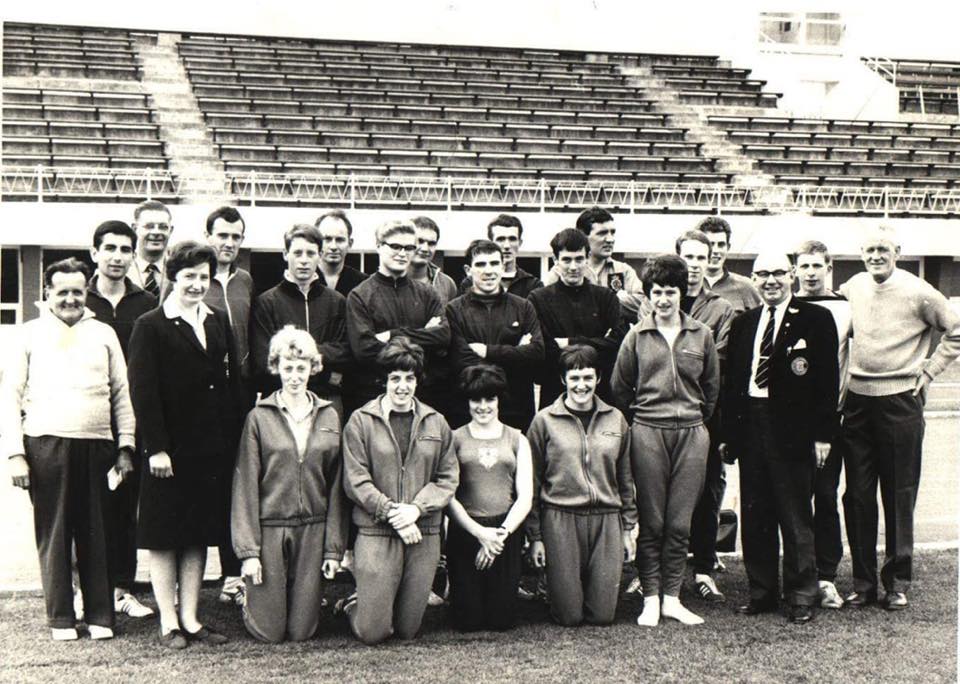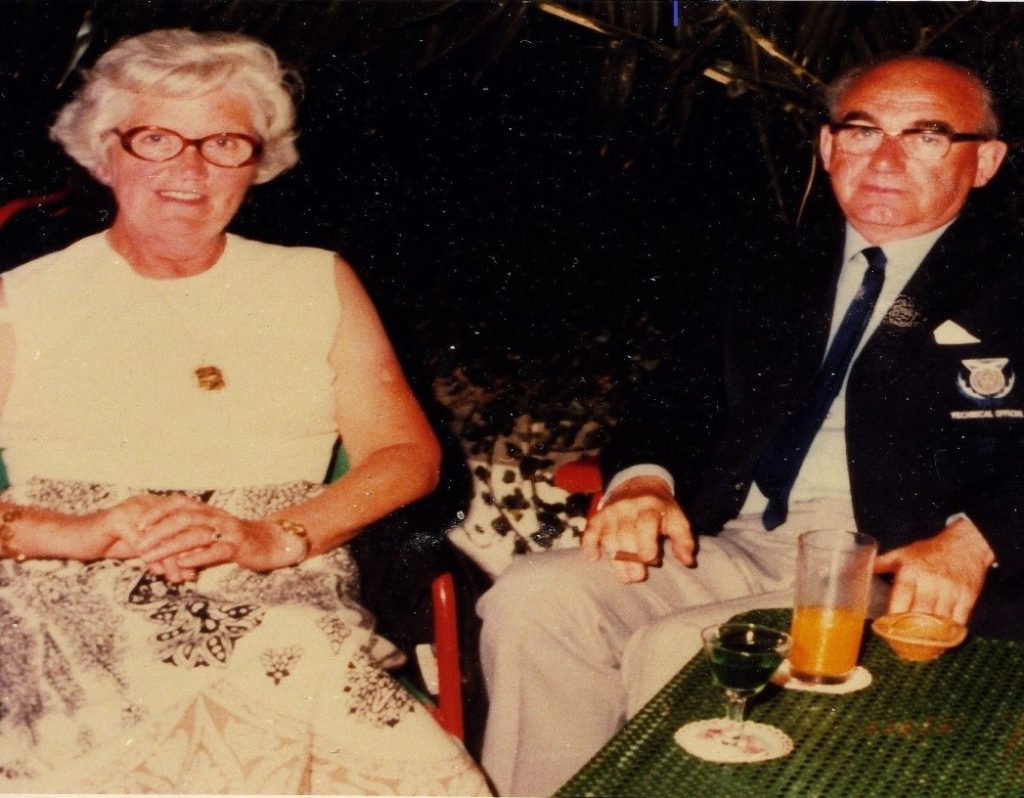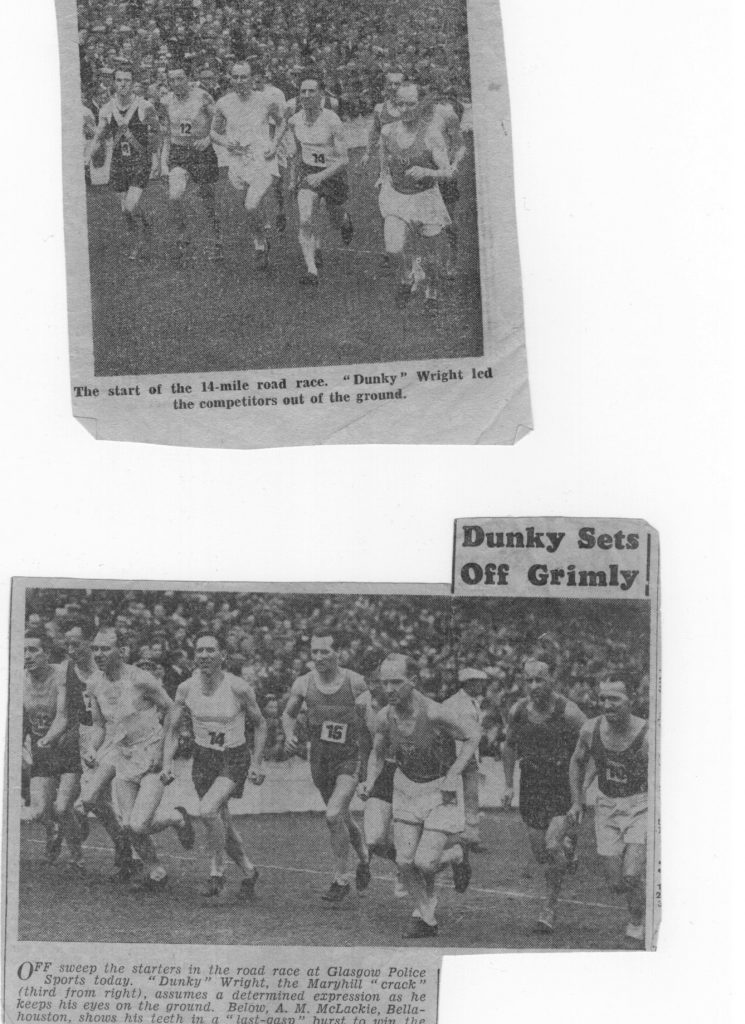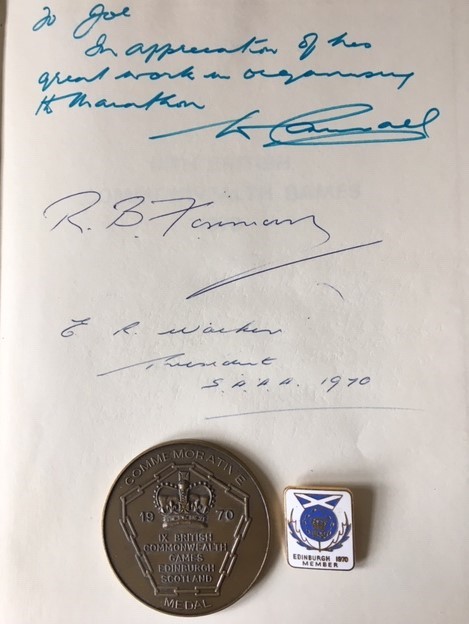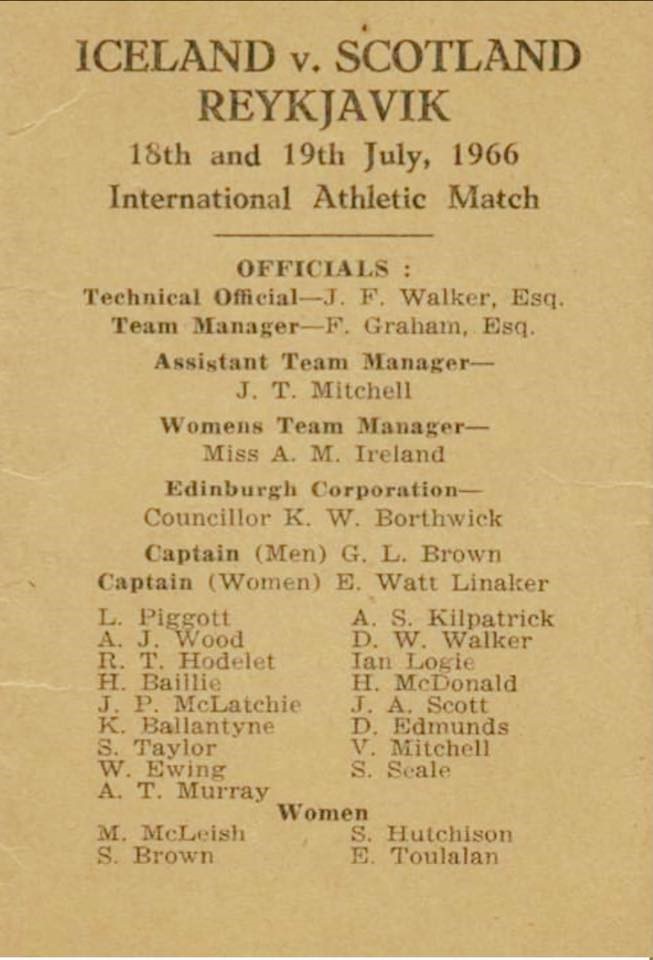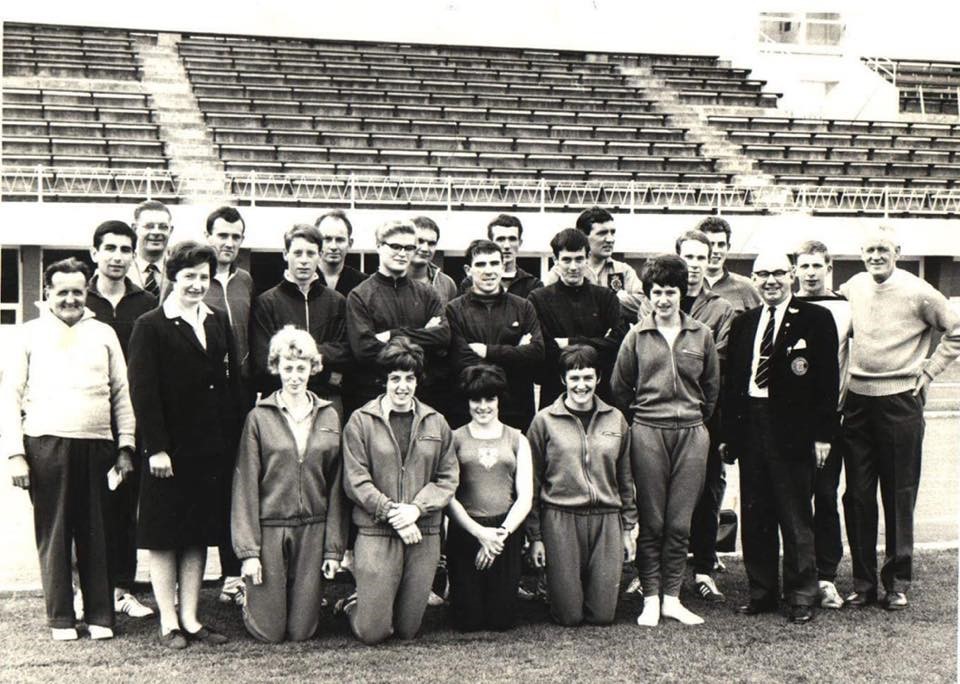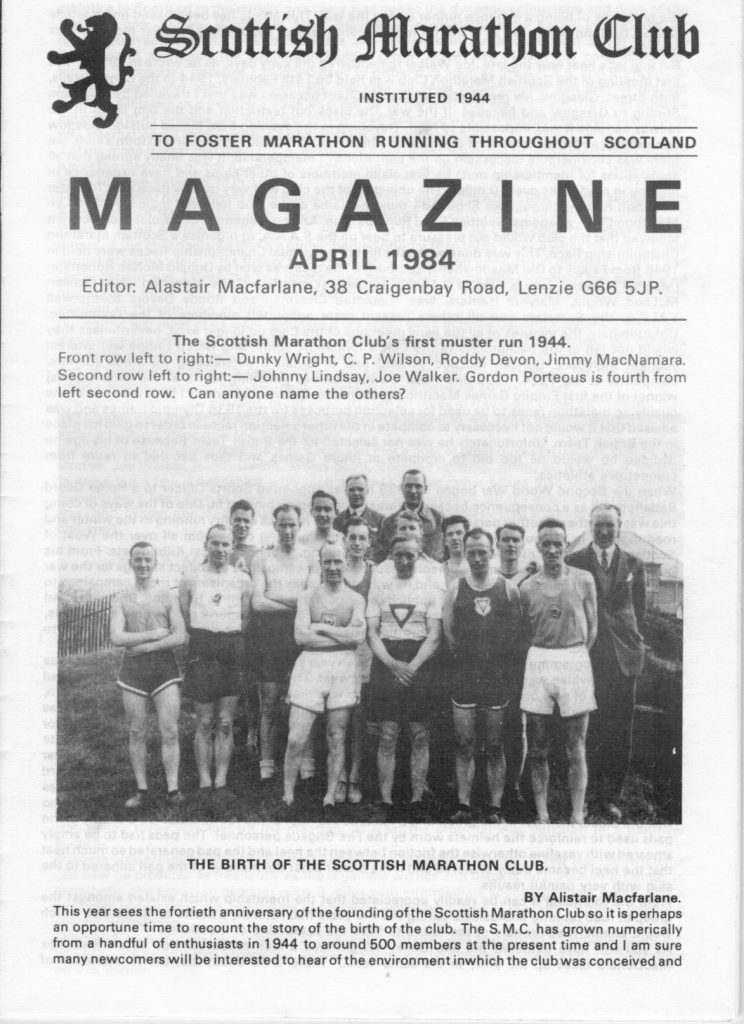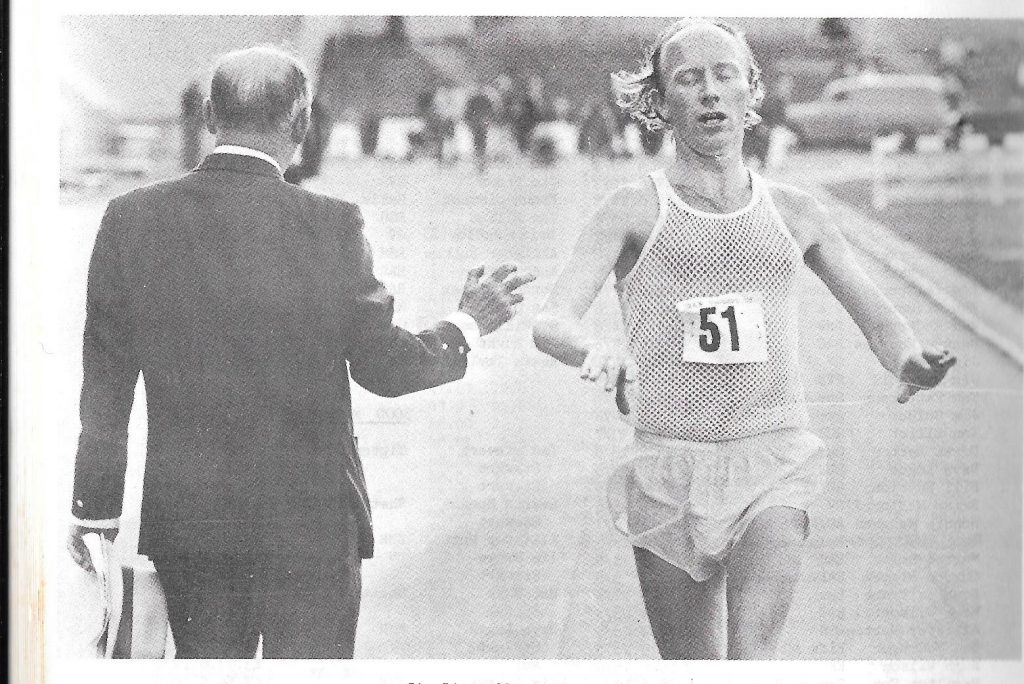…Joe Walker, third right in the blazer with Scottish team in Iceland, 1964.
Joe started … There’s a good article by Alastair here …
JOSEPH F WALKER OBE 1908 -1982:
by his son Jim Walker
Joe Walker had a very wide ranging and amazing commitment to the development, support, coordination and encouragement of others in athletics. This can be seen in a summary of his roles in that sport over his lifetime. He had an association throughout his life with athletics and distance running in Scotland. He ran as a schoolboy at St Mungo’s Academy, Glasgow and raced until his 40’s with St Modan’s AAC, Stirling.
After graduating with a First Class Honours in Chemistry from Glasgow University he trained as a teacher at Jordanhill. He briefly taught Science at St Mungo’s Academy before moving to St Modan’s High School in Stirling when it opened in 1933. He also taught and coordinated evening classes at Stirling High School.
In 1949 he transferred to a role in Technical Education Coordination in the West of Scotland and progressed to become Chief Officer of SCOTEC, the Scottish Technical Education Council. He was awarded an OBE in 1969 for his work in Technical Education.
St Modan’s Athletic Club
1933 – Founder and President of St Modan’s Amateur Athletic Club, Stirling
Scottish Schools Association
1933-49 Member of the Executive of the Scottish Schools Amateur Athletic Association and in 1949 he became an Honorary Vice President
1937-39 Member of the Executive of the Stirlingshire County Schools’ Sports Association
1936-48 Founder and Hon. Secretary of the Stirlingshire and Clackmannanshire Branch of Scottish Schools Amateur Athletic Association
Scottish Marathon Club
1944 Co-founder of the Scottish Marathon Club
1946-49 Honorary Treasurer
1949-61 Vice President
1962-69 President of the SMC
1969-81 Committee member
1972- Honorary Vice President
Scottish Amateur Athletic Association
1948-82 Grade 1 Judge of Track, Jumps, Throws and Marksman
1950-53 Member of the Executive
1952-53 Minute Secretary
1964 Vice President
1965 President of the SAAA
1976-82 Honorary Life Member
All these commitments ran alongside helping his wife Cath bring up a family of six children. One of their agreements was that when the children were young that he put them to bed at six before going out to meetings or to train, much to the unpopularity of the older children. All of the family helped out at some time in the tasks and errands associated with athletics and running. However his enthusiasm and commitment to athletics must have rubbed off on two of his sons.
His eldest, Joseph Q Walker, co-founded the Strathclyde University Athletic Club and was their President in 1965. His youngest son James ran for Bellahouston Harriers and Edinburgh University.
Joe Walker’s enthusiasm for athletics took him to two Olympic Games. At the 1936 Berlin Olympics he told the story of Hitler leaving the arena when Jesse Owens won the 100 metres. He also attended and helped at the Marathon at the 1948 Olympics in London, a much reduced but welcome event in the aftermath and recovery from the Second World War. Joe, amongst his many other roles, had a long association with Bridge Of Allan Highland Games. He encouraged them to convert from a professional gathering to becoming an amateur event, which they did in 1957. This broadened the games and aimed to encourage amateur athletes in Scotland. He served as Director of the Games for many years and in 1977 was the Games Chieftain.
Following Joe Walker’s death his wife Cath donated a cup in his memory to the Scottish Marathon Club to be presented annually for an outstanding contribution to marathon running.
A few of the available photos and achievements of Joe Walker running are shown next along with his influence on Joe McGhee, Commonwealth Games Marathon Champion in 1954, concluding with some recollections of his athletics involvement.
Joe third from the left can be seen setting off below on the 14 mile road race at the Glasgow Police Sports at Hampden.
Joe Walker achieved a standard medal in the Perth to Dundee Scottish Marathon Championship in 1948 when he was 40.
Joe McGhee, who won the 1954 Commonwealth Games Marathon in Vancouver taught and ran with Joe Walker at St Modan’s. In a radio interview after his Vancouver win Joe McGhee recognised the support, influence and encouragement Joe Walker had given him in his athletics career. There was a lot of controversy and media comment at the time on Jim Peters’ collapse from dehydration and that he did not finish. Joe Walker spoke out saying that Joe McGhee had won the race by modifying his pace to take account of the heat of that day. Interestingly when Jim Peters and Joe McGhee met at the London Marathon in 1996 the Evening Standard interviewed them together and quoted Jim Peters saying “Joe is the man who deserves every credit for having won on that terrible day. He was and remains the winner”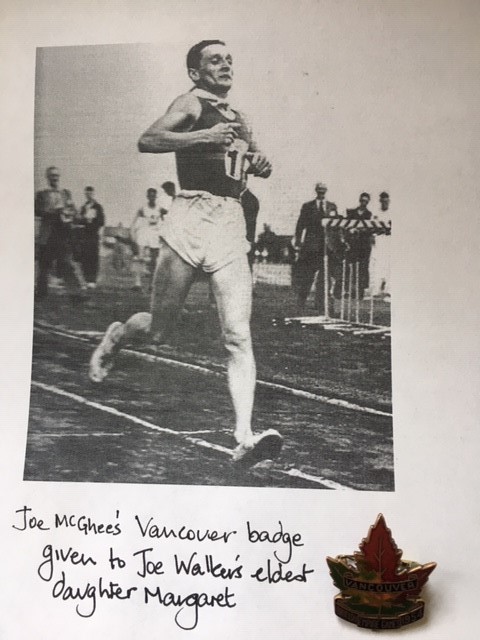
Joe McGhee himself taught and encouraged Mike Ryan who went to St Modans. After Mike emigrated to New Zealand in 1963 he won bronze at the 1966 Commonwealth Games Marathon in Jamaica behind Scottish gold medallist Jim Alder. Mike also won bronze at the 1968 Mexico Olympics Marathon and said as he was running he thought of the influence of Joe McGhee had on him.
Joe Walker’s son James accompanied his father as a teenager to many road racing, track and championship events as well as on the Highland Games circuit.
Some of James’s notable memories include attending the 1965 AAA’s Championships at White City during Joe’s SAAA presidential year. He recalls watching Ron Clarke the gentlemanly Australian, so outstandingly breaking the three mile world record that night. He was intrigued that Fergus Murray, Edinburgh University, finished sixth running in bare feet in that race! Afterwards at the team hotel his father introduced him to Harold Abrahams the 1924 Paris Olympics 100 metre winner. Harold Abrahams and Eric Liddell were central to the later Chariots of Fire film which Joe had greatly enjoyed.
In one of the Edinburgh to Glasgow ultra-long distance races Joe was the referee. There was some concern long after all the other runners had finished that one runner was unaccounted for. As the referee, Joe was told that there had been a cyclist accompanying the runner who had taken him in for tea at his house during the race. Joe then retraced the route to try to find the runner. He came across him in Springburn and he told him that all the timekeepers and officials had gone home and he was disqualified. This was despite the very vocal support to the runner from the crowd of men emerging from a local pub!
At the 1970 Commonwealth Games James remembers the euphoria when Lachie Stewart ‘set the games alight’ in overtaking Ron Clarke, Australia, in the home straight to win the 10,000 metres. Joe organised the Marathon at the Commonwealth Games which was a very successful event with Ron Hill, England winning from Scotland’s Jim Alder.
Joe’s role on the 1970 Commonwealth Games Athletics Technical sub-committee and as organiser of the Marathon was recognised in the Official History Book copy he was given. It was signed by Willie Carmichael Director of Organisation, Rab Forman Athletics Organiser and Ernie Walker, 1970 SAAA President.
In 1966 Joe was the Technical Official for the Scottish Athletics Team competing against Iceland. The memorable story he told of that trip was of the night Dougie Edmunds a heavyweight Scottish thrower was refused entry to an Icelandic restaurant because he was improperly dressed, he was wearing a kilt!
Joe Walker is on the right wearing a blazer
Appendix 1
(Extracts from the Scottish Marathon Club Minutes and records by Colin Youngson who received the JF Walker award from the Scottish Marathon Club in 1990)
A review of the SMC minutes available show that for many years, Joe was present at every SMC AGM and committee meeting, unless SAAA meetings clashed.
He was a delegate on the SAAA sub-committee to decide who won the annual Donald Robertson memorial trophy, for the most-deserving Scottish marathon (or ultra) runner of the year.
By 1961, Joe was organising the SAAA Track 10 Miles Championship and the SAAA Marathon Championship.
In 1966, Dunky Wright became Commandant of the Scottish team for the British Empire and Commonwealth Games in Jamaica. Despite Jim Alder winning the Commonwealth marathon, rather oddly the Robertson Trophy was presented (five votes to four) to Gordon Eadie, for winning the Manchester to Blackpool ultra.
By 1967, arguments rumbled on for several years about whether or not to accept Alastair Wood’s 2.13.45 European record marathon time in Forres 1966. (This was accepted in 1967 by the AAA and Athletics Weekly; and in recent years agreed by the prestigious American Road Running Statisticians to be the 1966 fastest time in the world; but was never ratified by SMC or SAAA.)
In 1968, along with his son James, Jimmy Scott and David Bowman, Joe walked the planned course for the SAAA Marathon held at Grangemouth in both 1967 and 1968. They rolled out a measuring wheel of one yard circumference; and found the turning point and the whole course to be accurate.
In 1971, the minutes make clear that Joe had been convener for the SAAA marathon championships for many years – he continued to fulfil this important responsibility until 1972. By then, his club had changed to Stirling AAC.
By 1977, Dunky Wright (1976) and Jimmy Scott (1977) had died, and Joe delivered an eloquent tribute to his old SMC friends. John Softley became Secretary/Treasurer.
At a committee meeting in November 1979, reference was made to the first Glasgow International Marathon (held on 14th October). This had been “very successful, due to the hard work of Mr J F Walker, in organising officials and the course”.
The last minutes in this journal were for a committee meeting on 23rd February 1981. Joe Walker reported that the 1981 SAAA Marathon would no longer be on the usual out and back course from Meadowbank Stadium. The police and local retailers had objected.
Appendix 2
Joe Walker can be seen in the photo of the inaugural muster run of the Scottish Marathon Club in 1944, in their 1984 magazine which celebrated their 40th Anniversary. It records Joe’s account of the club’s inception and challenges that runners faced in those early days.
“This year sees the fortieth anniversary of the founding of the Scottish Marathon Club so it is perhaps an opportune time to recount the story of the birth of the club. The SMC has grown numerically from a handful of enthusiasts in 1944 to around 500 members at the present time and I am sure that many newcomers will be interested to hear of the environment in which the club was conceived and the problems of being a distance runner during the War. This article has been based on one written by John Softley in 1978 and on more recent material supplied by founder member Alex McDonald.
But first let’s hear how the late Joe Walker remembered the early days as he wrote in 1978 – ‘the first meeting of the Scottish Marathon Club was held on 14th February 1944 in the Central Halls, Bath Street, Glasgow. My recollection of the important occasion was that I travelled by train from Stirling to Glasgow and because of the war, the black-out restrictions and the dim light in the railway carriage it was impossible to read. Travelling in the evening from places outside Glasgow was difficult and this affected the attendance. There was no difficulty in deciding to form a club but there was considerable discussion of the conditions of membership. It was finally agreed that all applications for membership must be first claim members of other clubs and must have experience of running in road races over 10 miles. The objective of the club was very quickly decided – to foster marathon running throughout Scotland – thus the name of the club followed logically – the Scottish Marathon Club as against the Scottish Road Runners Club. As a consequence of the club’s objective it followed that the club would bring pressure to bear on the SAAA to organise a Scottish Championship Marathon Race. This was done when the first of the annual championship races was held in 1946 from Falkirk to Old Meadowbank, Edinburgh. The race was won by Donald MacNab Robertson (Maryhill Harriers) with a time of 2: 46:02. At the first meeting of the Marathon Club Duncan McLeod Wright, Maryhill Harriers was appointed Chairman and Roddy Devon, Motherwell YMCA, Secretary and all others present were members of the Committee. Unfortunately the Minutes of the very early meetings of the club no longer exist nevertheless they would not tell of the background to the club’s formation, something which I hope will interest younger members. Duncan McLeod Wright, one of Britain’s outstanding marathon runners, competitor at the 1924, 1928 and 1932 Olympic Games (finishing fourth at the latter Games), winner of the first Empire Games Marathon in Hamilton, Ontario, Canada, in 1930, won one of the qualifying marathon races to be used for selection for the 1936 Olympic Games and was advised that it would not be necessary to compete in any of the other selection races to gain his place in the British team. Because of his age he decided to retire from competitive athletics.
When the Second World War began in 1939 he was appointed Sports Officer to a Home Guard Battalion and as a consequence became interested in keeping himself fit. One of the ways of doing this was to gather together persons who were interested in cross country running in the winter and road running in the summer. The enthusiasts for road running came from all over the West of Scotland and muster runs were held in Glasgow, Stirling, Greenock, West Kilbride, etc. From his business contacts he knew many persons responsible for campaigns to collect savings for the war effort in different parts of the country and he was able to coax the organisers of these campaigns to have a road race incorporated into their publicity arrangements. eg Stirling, Hamilton, Bridge of Allan or encourage sports promoters to incorporate a road race in their Sports Programme (eg Shotts, Lennoxtown, Kilbarchan, Milngavie and Port Glasgow) or help to have road races such as Perth to Dundee revived.
The heavy programme of muster runs and races each year soon wore out the soles of our sandshoes (gym shoes) which were the athlete’s normal footwear. The replacement of these shoes required the purchase of new ones but the biggest problem was that one was required to surrendered in addition clothing coupons. Each person’s annual supply of clothing coupons was very limited and it was difficult to spread them over the normal clothing requirements without having to allocate some for additional needs. As the War wore on it became more and more difficult for each athlete to allocate coupons for sandshoes and thus road running would soon have ceased for the duration of the War. However Duncan managed to obtain for us replacements for our worn out sandshoes – the standard issue having brown canvas uppers with a very thin rubber or composite sole and heel. To protect the heel Jimmy McNamara who was the oldest member of the group and a full time member of the A.R.P. obtained a supply of the pads used to reinforce the worn by Fire Brigade personnel. The pads had to be amply smeared with Vaseline otherwise the friction between the heel and the pad generated so much heat that the heel became badly blistered and if the blister burst the material of the pad adhered to the skin with very painful results.
From the foregoing it can be readily appreciated that the friendship which existed amongst the group of road running enthusiasts during the War years had naturally a desire to form a club which would enable road runners of the future to have the same kind of friendship. As you will have gathered the late Dunky Wright was a man much admired by all and Alex McDonald takes up the story in the same vein….”there is no doubt that the resuscitation of athletics in Scotland in the middle war years was due to the dynamic enthusiasm and drive of the one and only Dunky Wright. In 1943 he chaired a meeting to be called in Glasgow for representatives from all clubs which were still operative in the Midland and South Western Districts and, as a result, the ‘temporary’ Scottish Cross Country Association was ‘constitutionally’ formed. ‘Temporary’ because it had pledged itself to disband as soon as the SAAA and NCCU resumed command and ‘constitutionally’ because its chief constitutional aim was to present Scottish Athletics in a healthy a state as possible to the post war era. Perhaps the most positive indication of its success lies in the fact that in 1946 Scotland was in a position to host the first post war international cross country championships at Ayr Racecourse.
Let me make it clear that the SCCA did not of itself give birth to the Scottish Marathon Club but it was the members of that Association – again with Duncan Wright in the driving seat – who created the SMC on February 14th, 1944. The first muster run was held from Pollokshaws Baths on 7th April 1944 and the second from Auchmountain Harriers’ (my club) pavilion in Greenock on 28th April 1944.
When I joined Auchmountain Harriers aged 17 in the 1929/1930 cross country season the ‘old timers’ of the club declared that if a runner trained oftener than three times a week he was in grave danger of going ‘stale’. This theory had of course been exploded in the outer world and Dunky Wright was I think the first Scottish disciple of Paavo Nurmi who pioneered fast even paced running and more – much more – concentrated training but only the great ambitious enthusiasts imbibed in that practice at that time.
During the War most of us were fortunate if we could indulge in three training sessions a week and many were too tired by overtime working to attempt it. After the War of course the Zatopek standards of dedicated perpetual slogging, the individual study of body building for the job in hand and of artificial film loops with sensible diets, etc, etc became musts for the ambitious athlete whose twice a day, six days a week training became commonplace.
One wonders what one missed? In ’33 aged 20 I ran 10 miles at Hampden under 55 minutes, took half a minute off that in ’38 and was only 20 seconds slower in ’46. What might I have done with today’s training and knowledge?
But I thoroughly enjoyed it all the way and met a host of great guys like Duncan Wright, Jim Morton, Joe Walker, Roddy Devon, Jimmy Scott, George Pickering, Jimmy McNamara, Andy Blair to name but a few. Friendships such as these are far richer prizes than things that glitter. It would have been nice to have climbed some higher mountains but the Scottish Marathon Club was – and I know still is – as great a friendship club as it is an athletic club and long may it continue that way!”
***
Joe telling Jim Dingwall that he had finished the 1977 SAAA marathon
